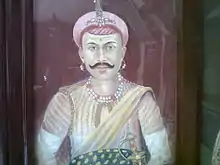Chimaji Appa
Chimaji Balaji Bhat (1707–1740), commonly referred to as Appa or Bhau, was the son of Balaji Vishwanath Bhat and the younger brother of Bajirao Peshwa of Maratha Empire. He was an able military commander who liberated the western coast of India from Portuguese rule. The high watermark of his career was the capture of Vasai fort from the Portuguese. He was known to run strategy for the Maratha Empire and was known to plan all the battles for Bajirao.
Chimaji Bhat | |
|---|---|
 | |
| Born | 1707 |
| Died | 17 December 1740 (aged 32–33) |
| Occupation(s) | Commander of Maratha forces (in some missions), Deputy Peshwa (unofficial), Chief Strategic Advisor in all affairs, Jagirdar (nominal), Panditrao and Health Minister |
| Known for | Great warrior and younger brother of Baji Rao I |
| Spouse | Rakhmabai |
| Children | Sadashivrao Bhau |
| Parent |
|
| Relatives | Bajirao I (brother) Balaji Bajirao (nephew) Raghunathrao (nephew) Shamsher Bahadur I (nephew) |
Maratha campaigns against the Portuguese

Chimaji Appa concentrated his energies towards the Western Ghats. Vasai (formerly known as Bassein) was the ultimate objective of the war, as this was the capital of the provincial government of Portugal's northern Indian state.
Capture of Belapur Castle
In 1733, the Marathas, led by Chimaji Appa, with Sardar Shankarbuwa Shinde wrested control of the Belapur Fort from the Portuguese.
The capture of Vasai
After careful planning, Chimaji Appa led Maratha armies into the occupied territories in 1737. Chimaji's strategy was to go for the weakest link in the chain to the strongest, thereby progressively weakening the Portuguese.
On 28 March 1737, Maratha forces led by Ranojirao Shinde and Shankarbuwa Shinde captured the strategic island fortress of Arnala, thus cutting off a crucial relief line to Vasai. Thane and Salsette Island were freed in 1737.
In November 1738, Chimaji Appa captured the fort of Dahanu and on 20 January 1739, Mahim capitulated. This was speedily followed by the capture of the forts of Kelve/Mahim by Chengojirao Shinde, Sirgão – by Ranojirao Shinde, Tarapur – by Janojirao Shinde, and Asserim on 13 February 1739 by Chimajirao Peshwa self. On 28 March 1739 Portuguese lost the island and the fortress of Karanja to Raoloji Shinde's forces.
Finally in February 1739, Chimaji Appa invaded Bassein Fort. He first occupied Versova fort., Dharavi and blockaded Bassein Creek. Then mines were laid at various points under the fort walls and detonated, causing a breach in the wall. As the Marathas including Ranojirao Shinde and his cousin grandfather Janojirao, son of Shrimant Changojirao poured into the fortress, the Portuguese fought on using their technically advanced weapons and artillery, causing high casualties among the Marathas. Inch by inch the fort was secured and resistance contained in small pockets. On 16 May, the Portuguese army surrendered. Portuguese Captain Caetano de Souza Pereira signed the surrender as most of the top army officers were already dead.

Chimaji was magnanimous in victory, and surviving Portuguese were given a safe passage from the city. Portuguese were given eight days to take all their movable property and move out. Accordingly, the last remnants of Portuguese army and administration pulled out of Vasai by 23 May 1739. The Portuguese sources record that during the entire war with Chimaji Appa during 1737–1740, besides the Northern Province's capital Baçaim (Portuguese name for Vasai), they further lost eight cities, four chief ports, twenty fortress, two fortified hills and 340 villages. The losses amounted to nearly the whole of the Northern Provinces.
To celebrate his victory and to fulfill a vow taken in front of Devi Vajreshwari, Chimaji Appa had a temple built for the goddess nearby. The Vajreshwari Temple still stands there as a relic of Maratha glory. Chimaji Appa collected five large bells after he won in war against the Portuguese from Vasai Fort. He offered the bells at Bhimashankar, at Menavali near Wai in front of a Shiva Temple on the banks of the Krishna river, Banshanker Temple (Pune), Omkareshwar Temple (Pune) and Ramlinga temple Shirur.
Chimaji Appa is a well known and highly respected figure within Vasai, Bhayandar, Virar, Thane and Navghar region. Konkani celebrate his victory even today on Gudi Padwa a Maharashtri new year. Appa's contribution to Agri history is carried forward through generations through classic Powada across Maharashtra. He founded and renamed many villages including Vasai now a suburb, Bhayandar now a suburb, Virar now a town, Navghar now a town, Murdha, Rai, Morva, Dongri, Gorai and many more.
Death
Chimaji Appa died on 17 December 1740 just 6 months after the death of his elder brother Bajirao I.
In popular culture
- In the 2015 drama film Bajirao Mastani directed by Sanjay Leela Bhansali, Chimaji Appa was portrayed by Vaibhav Tatwawadi
- In the popular historical drama Peshwa Bajirao, which has been telecasted on Sony TV from 23 January 2017, the character of Chimaji Appa has been portrayed by the young child artist Ayaan Zubair Rehmani and the elder version is being played by actor Saurabh Gokhale.
Legacy
The ground in Vasai, a suburb of Mumbai, is named after him. The name of Ground is Chimaji Appa Kridangan. A memorial has been built near the Vasai Fort containing a statue of Chimaji Appa along with a garden.
Further reading
- Prakash Harischandra: Chimaji Appasaheb Peshwa: The Slayer of Portuguese Regime. ISBN 978-1697751659